Warning: Some of these truths can be triggering for people, and getting value from this article requires an open mind. If you have trouble with challenging ideas, I suggest clicking away and keeping your peace of mind. (Also, this is my first post in /ProofOfBrain , please be gentle :D)
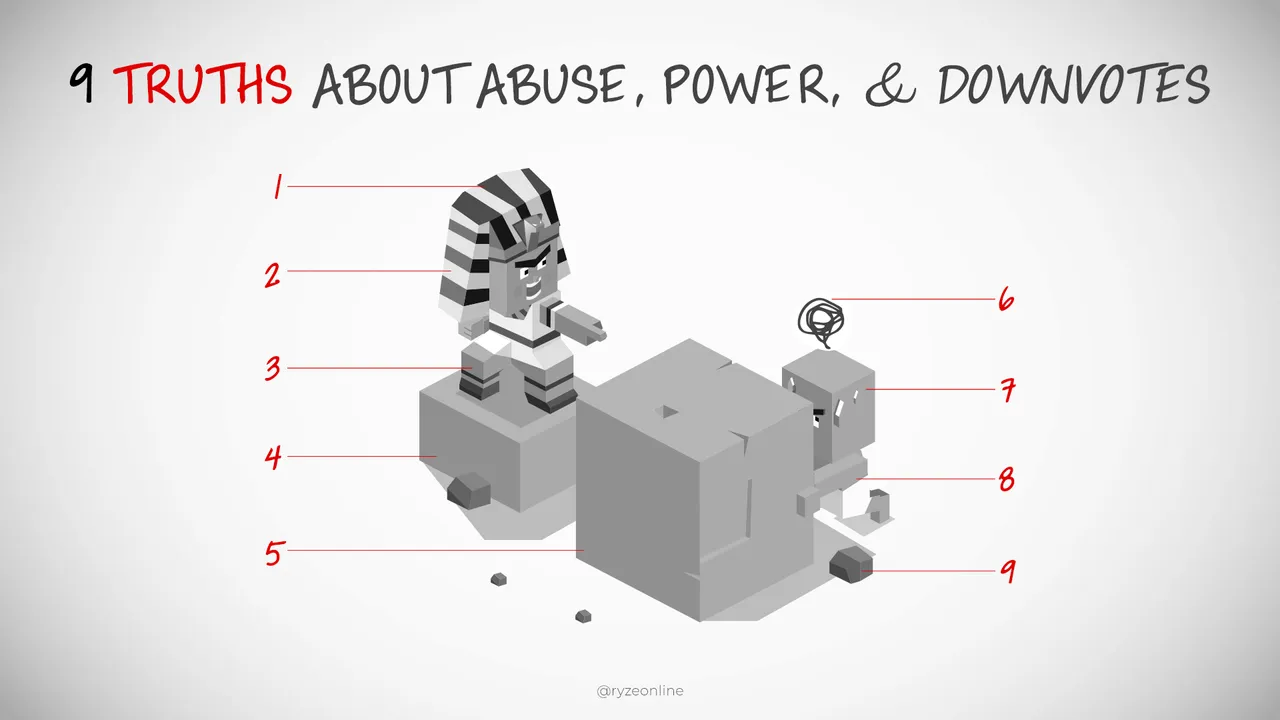
I believe most (if not all) Hivers have good hearts.
If you're reading this, chances are you're well-intentioned, and that's how I see you. It’s wonderful. Because people with good hearts are amazing, they're the core of any good community. But what happens when good hearts don't have the clearest minds? For example, say a child wants to brighten Mom's birthday as a surprise, so they light some candles in an empty house. And let's say that without a clear understanding of fire safety, the child literally burns the family's house down. The child had a good heart, but their lack of education, or their over-enthusiasm, or their less-than-clear thinking has created an extremely 'burdensome' result on their community (the family unit.)
Many parents wouldn't be too angry with a kid who did this, because as they cry their apologies to us, we can read and understand their good-hearted intentions, and we don't blame them for their lack of education or unclear thought-processes. But at the same time, we'd realize it's very, very important to educate young people and teach them to think things through as clearly as possible. A good heart that doesn’t know some important truths about living, can accidentally cause a tremendous amount of damage.
So I’m going to share some truths that most parents and teachers neglect.
I’m obsessed with truth, clarity, and understanding. If you read any of the quarter-million words I’ve written on Hive in the last few months, you’ll notice a strong theme of truth running through them.
- I wrote 14,000+ words on censorship, free speech, and power. Full of truth.
- I wrote 16,000+ words on intelligence, smart decisions, and genius. Full of truth.
- I wrote 19,000+ words on what communication is and how to master it. Full of truth.
I've basically written an entire book on the above 3 topics combined.
And I posted it on the blockchain for all to read.
Another example of my obsession with truth: In my (special, ‘gifted’) high-school, I out-debated my philosophy teacher and began skipping his class because I was bored. He practically begged me to return, calling me "his best student by a mile." I never went back. (I was an asshole as a kid.) Finding truth requires an extremely open mind, nearly-zero ego, and a passion for admitting any flawed beliefs that crop up. I've transformed over 10,000 beliefs in my life, and I love opening my mind to varied perspectives and diverse ideas. (The more data, the better.) What this all means, is that I've thought and talked through most of the things people bring up on the controversial topics below. It doesn't mean I'm automatically right, or that I'm not open to input or feedback. But hopefully it lets you know I've dedicated large chunks of my life to understanding many of the topics I address below, and though I encourage people to analyze ideas on their merit alone, my experience may still be worth considering before you respond. Hopefully it helps you realize another truth:
That I know what I'm talking about. Especially when concerned with truth, clarity, and understanding, and the 9 truths I’m about to share are ones most people don’t realize, or think about, or pay attention to. They’re truths many have little understanding about. And without knowing them, you may be causing yourself problems, pain, and stress in your life. How? Well, fighting truths in life tends to cause a lot of issues. Think about the truth of gravity.
Fighting gravity isn’t a good idea.
Whether we use a plane or a rocket ship, the gravity of earth or some celestial body will always win, sooner or later. It’s a simple truth. Pretending gravity doesn’t exist, then flapping your arms as you jump off a building won’t go well for you. Arguing that gravity’s existence is ‘untrue’ will waste a lot of breath, time, and energy that you could’ve been using to grow your biz, travel with family, or improve your health. Doing anything with gravity other than accepting the clear truth of its existence, is a recipe for struggle. But by understanding the truth of it, you can turn it to your advantage, and live more fulfillingly. The Wright Bros. understood gravity, friction, aerodynamics, and other laws of physics, and they worked with those truths to invent an airplane. They knew fighting gravity was foolish, but by using it they’d soar to great heights.
So with that in mind, let's get a bit more intimate with some often misunderstood truths.
Power imbalances are inescapable.
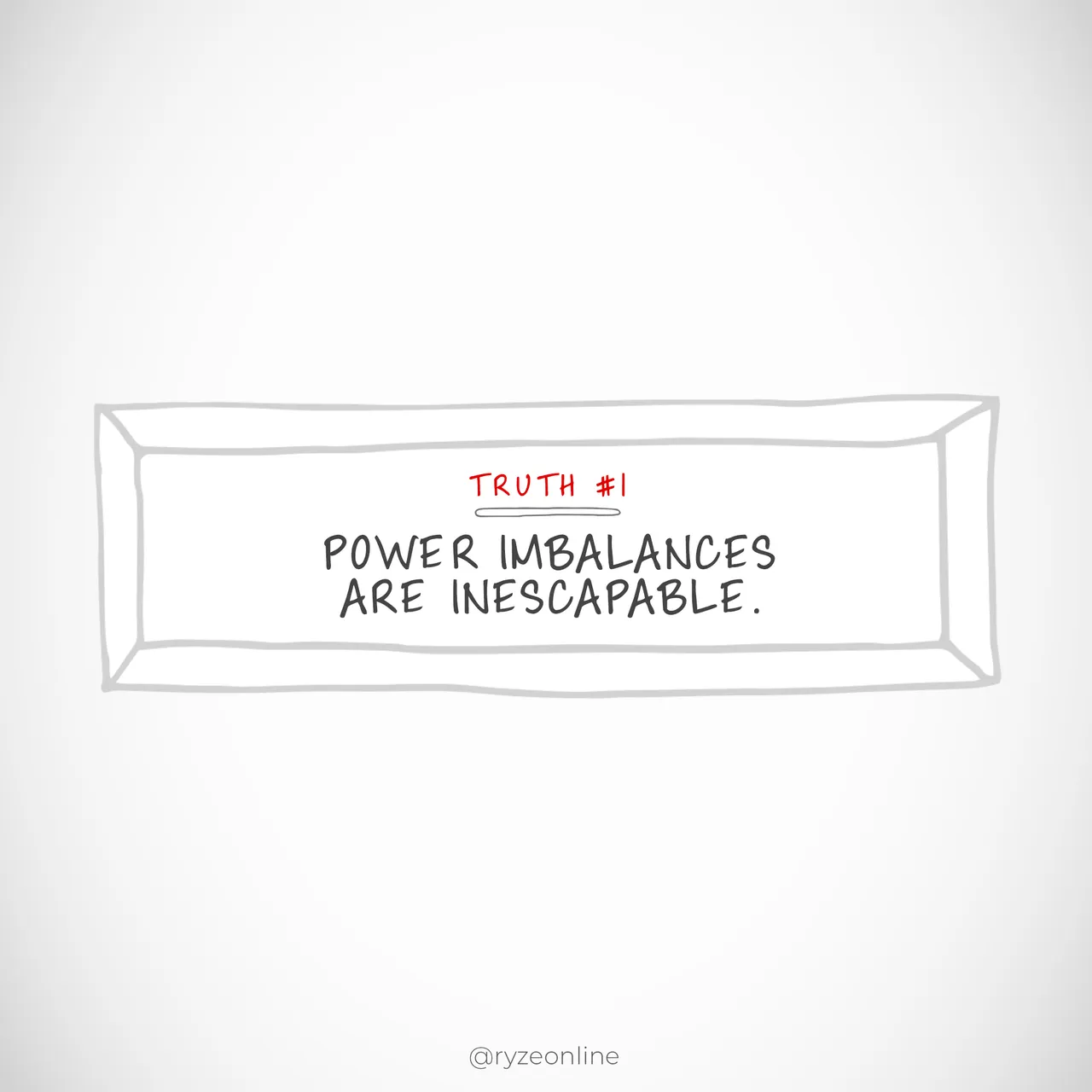
In nature, not every species has equal power. And in a single species, not every member has equal power. One lion, tree, or insect will always hold more power and influence, or claim more resources, than others. Humans have natural bodies, evolved by mother nature, and as part of nature, humans are subject to this exact same principle/law. There will always be one human (in any given group of humans) that has 'more power.' One who has more strength. Or more intelligence. Or more resources. Or more popularity. Or more persuasiveness. These traits are not equal across the board. Just like all other species, one human in a group of humans, will simply have more power in a given moment.
For thousands of years societies have been trying to get 'everyone to agree', and 'play nice.' Literally zero progress has been made in this, and never will be because the universe is designed as 'anti-agreement.' The universe is designed for contrast, polarity, variety, diversity. Lions won't ever agree with gazelles, nor should they.
Somehow human beings got the idea that the best life is one where everyone agrees on things, and many leaders have aimed to achieve such a thing. Instead of reaching higher agreement though, we've progressed backwards, because now with a population of 7B+, more people disagree than ever before. And on more topics than we've ever had. There are more perspectives and views than ever. Even in 'decentralized' projects, power imbalances are inescapable.
How This Applies To Hive:
Trying to remove or equalize power imbalances, while seemingly noble, is ultimately futile, and runs counter to nature.
There will never, ever, ever be an equal ‘power balance’ on Hive, or in any group.
We May Ask Ourselves:
Have we ever, in the entire history of civilization, ever seen a group with completely balanced power levels in it’s members? How are we planning to 'break' nature in a way thousands of passionate humans haven't been able to?
Any human can become abusive.
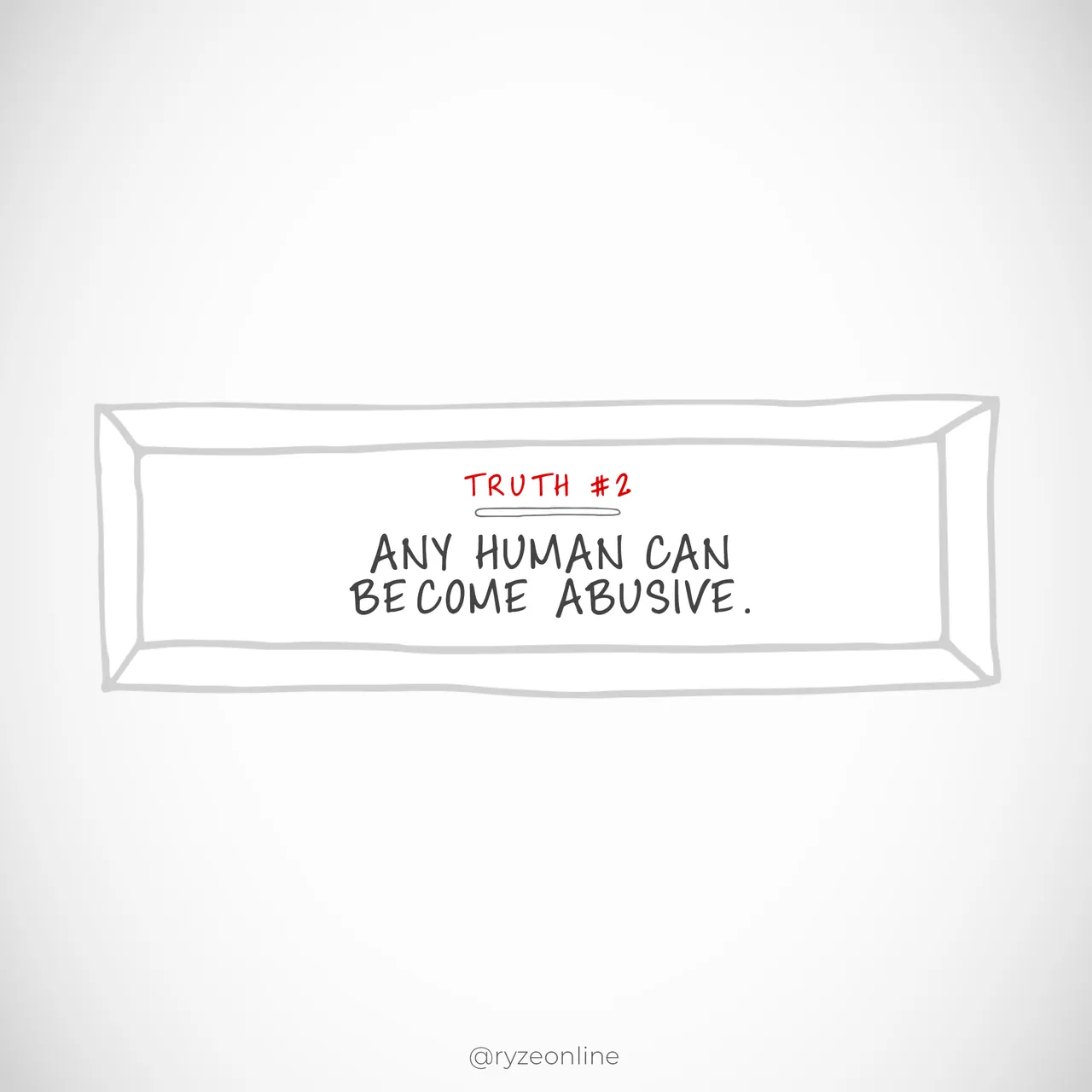
Babies love everyone. They're born almost entirely innocent and carefree, simply looking to grow as best as they're able. Their eyes often can't even distinguish color properly until they're a few months old. But they learn very quickly, and very early, from the examples parents, teachers, and society provides to them. And the examples provided are almost entirely flawed people with biases, prejudices, prejudgments, agendas, guilt, shame, blame, frustration, misunderstanding, and more.
So the fresh souls coming to earth almost instantly start picking up by osmosis, abusive tendencies, microaggressions, and so on. They rapidly become trained away from their loving, innocent selves. Their minds become as warped as their peers, their emotions become as immature as their peers. And the actions we perform, the actions a person takes, are controlled by their beliefs & mindset, plus their emotional maturity. Those two things decide whether a person chooses to abuse others, or not. Occasionally there will be a child who grows in a healthy environment, with healthy examples to learn from. Or a child who somehow manages to reject the flawed, unconsciously abusive examples they're provided with and conduct themselves more kindly and lovingly, but these are the Buddhas or Thich Nhat Hans of the world, few and far between.
The point is, nature births all creatures to evolve, expand, and grow into new, healthy paradigms, and that is the nature of humans too. Every human is born valuable and wonderful, just like every plant and animal is. And the same way we can put an animal in a strange environment, then train them to be cruel, people often get similar training, especially children. What we end up with is confused, prejudicial, overly self-interested adults in our communities. We end up with people who choose fear over love, who behave illogically and harmfully to the group, and unconsciously abuse others without even realizing it. The important thing about all this is: People do this because of their constant immersion in 'abuse training' from their environment and peers, beginning from the day of their birth, possibly sooner.
Humans aren't abusive upon conception, but they rapidly become that way. This means at their core nature, humans are loving, or at least neutral. So all that's necessary is to de-condition and un-learn the suboptimal training they've been given.
How This Applies To Hive:
Instead of labeling abusers, pointing fingers, and acting self-righteous as if we've never made a choice out of fear, or unconsciously engaged in abusive behaviors... it's more productive to extend compassion, consideration, and understanding towards abusers, rather than create more drama. This doesn't mean let abusers have their way or let them walk all over people, it means a better path is setting firm and healthy boundaries out of love, not anger, malice, blame, or frustration. It also doesn't excuse abusive people from their behavior, everyone has free will to choose to be an awesome human, regardless of the teachings, training, and examples around them. That said, acting like someone's abusive behavior is who they are at their core, born irredeemable, is not a recommended approach, because abuse is taught, not innate.
Chances are you will mistreat a fellow Hiver without even realizing it, like all humans have the potential to do.
We May Ask Ourselves:
Is any human --ourselves included-- capable of making 100% loving, non-abusive decisions for the trillions of choices presented to us in a lifetime?
Not everyone is good at critical thinking.
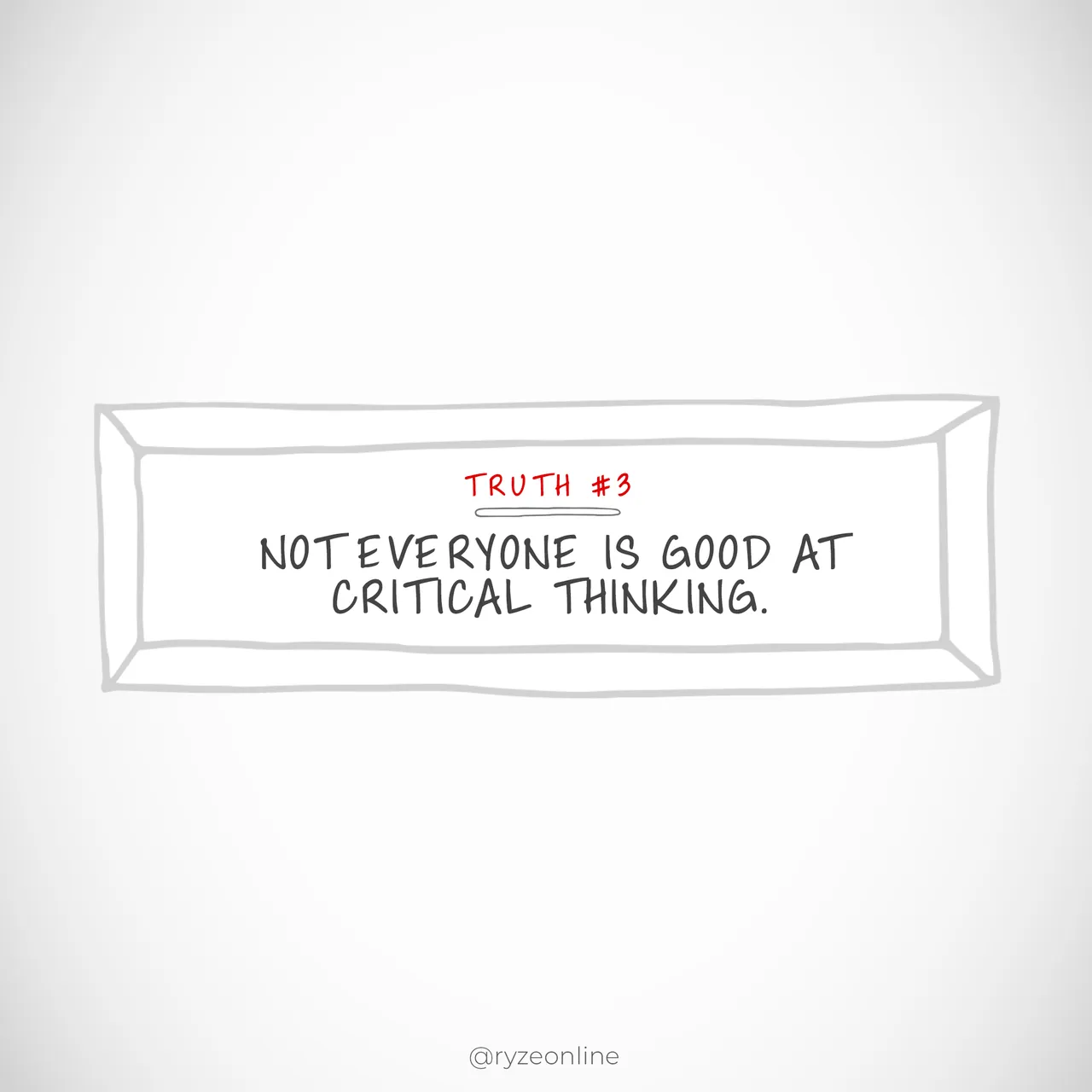
I'd love every person to be decent at critical thinking, but critical thinking is a skill. And like all skills, some are good at it, and others just... aren't. So when we communicate (send) our thoughts and ideas to someone who receives our information, four scenarios are possible:
- A. Our critical thinking is superior to the receiver and they realize this and listen to our insights.
- B. Our critical thinking is superior to the receiver but they don't realize this and refuse to listen to our insights, insisting on their beliefs.
- C. Our critical thinking is inferior to the receiver and we both realize this and correction occurs.
- D. Our critical thinking is inferior to the receiver but one (or both) of us doesn't realize this, and we butt heads with zero correction happening.
It may be tempting to think that critical thinking isn't important. But critical thinking lets us determine what is worthwhile and what to pursue. It lets us know what to ignore, and what to fight for. If a person can't think critically they end up being in the wrong place, at the wrong time, and get the wrong result. It makes them fight unnecessary battles, waste tons of energy, and be hugely counterproductive.
Low critical thinking is responsible for much of people’s ‘attacks’ & ‘triggered’ behavior. It also keeps them in terrible situations, elevating their own trauma. For example, a person who can't think critically often knows they should leave an abusive relationship, but remains for decades "for the kids", or something. Or they know that quitting cigarettes would be a huge win for them, and for their family, and society, but unable to think critically, they instead keep smoking until they get cancer. Terrible choices come from low critical thinking skills. Even simple things like "Should I feed this troll?" requires critical thinking skills to navigate properly. You need a healthily critical mind to survive in a world of 7B+ viewpoints.
So until our society prioritizes teaching critical thinking to its members, sadly, scenarios A & C will be quite rare, and scenarios B & D will reign supreme. This makes productive communication, leadership, or consensus on how to run a society extremely difficult. Because the people with the highest critical thinking skills will almost never be listened to. In fact, they'll often give up bothering to share their well-thought-out ideas because it's an exercise in futility. And the next truth (#4) makes this even worse.
How This Applies To Hive:
Hive, like any society, will struggle to get along and grow smoothly without a focus on critical thinking skills. Critical thinking means letting go of dogma, knee-jerk reactions, and biased beliefs. It’s a key pillar of clear-mindedness, and the more Hivers who seek truth, let go of dogma, and think critically, the better Hive can grow.
Expecting anyone to think through your points clearly is a recipe for frustration.
We May Ask Ourselves:
Does it make sense that I have better critical thinking skills than everyone around me, as well as everyone I encounter on the internet? Why or why not?
Most people don't assess their skills well.
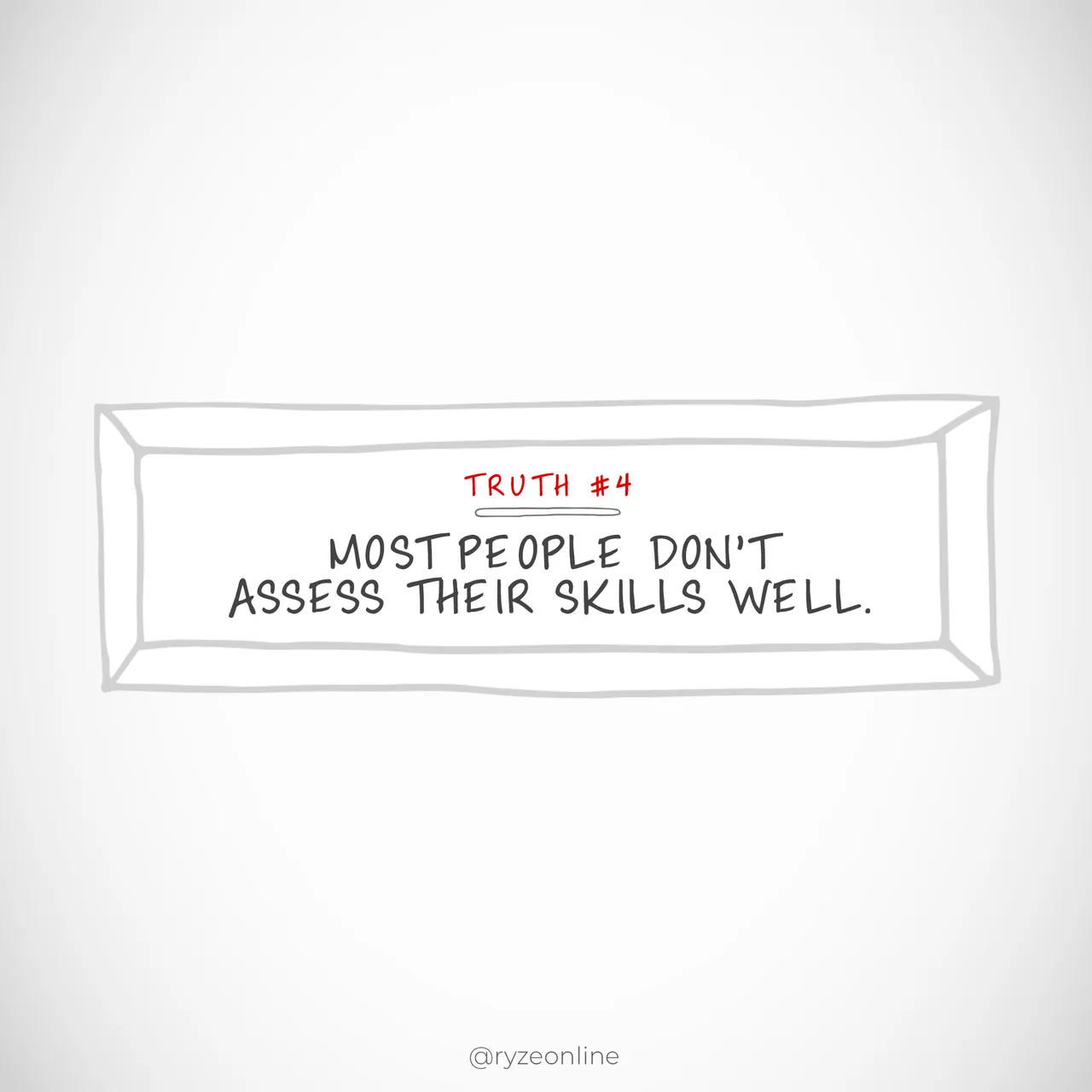
And usually this means people think they’re better than others, when they’re in fact, worse. Which creates superiority complexes, arrogance, and even cruelty. Now, there are some people who are quite good at self-assessment. They exist, but they're rare. For example, I'm below average at relaxation, and 'connection' with others, and being kind/patient with slower thinkers. In fact, I'm pretty terrible at all three. Is it fun to admit this? Not really. Is it a huge boost to my self-esteem? Nope, more of a hit. But at least I'm being honest about my self assessment, and I make a point of being so for all topics, fields, and skills.
But a huge majority of people in our society refuse to do this. And since most people are bad at assessing their own skill-levels, most people delude themselves into a) believing they're good at self-assessment, and b) that they're above-average at everything else, because they have 'great self assessment skills.' Survey a group of people with questions such as: Are you an above-average driver? "Of course." Are you an above-average conversationalist? "Of course." Are you above average in your chosen career? "Of course." This is how it will go. But this is bullshit. 100% not true. Not even physically possible for everyone in a group to be above average. That's what 'average' means. It goes against the laws of math, physics, and nature. Some people have to be below average at some things. Some people are above. Most are average. That's why it's the average.
Taking it a step further, since most people aren’t able to assess their own skills, most people aren’t able to assess if a leader is going to make a positive impact or not. Are you an above average leader? “Of course.” (Who is a better leader for the nation, Hilary or Trump?)
How This Applies To Hive:
When you assess yourself as 'right' and others as 'wrong', there's a high chance you're flat-out incorrect. Just because of math, physics, and nature... especially in our society, there is a very high chance you're wrong about something, somewhere, due to poor assessment of self and others. Due to considering ourselves above-average at something like conversation, critical thinking, human psychology, etc. It sucks to admit this, but it's very important to address it.
"I might be wrong here," is the approach of Einstein, Tesla, Socrates, and other great minds. It's the mark of someone eager to assess themselves and their skills correctly, rather than delude themselves into dogmatic righteousness. "This person I'm talking to, even though they annoy me, might be onto something," can only come from someone open-minded enough to self-assess well. Hive, like most societies, could use a huge upgrade in self-assessment, and through that, fulfilling growth and progress can be achieved, whereas without it, things will stagnate, or even degrade.
You are likely self-deluded about one or more skills or situations.
We May Ask Ourselves:
What skills or situations is there a chance of me assessing incorrectly in my life?
Using crowd-wisdom is like playing with fire.
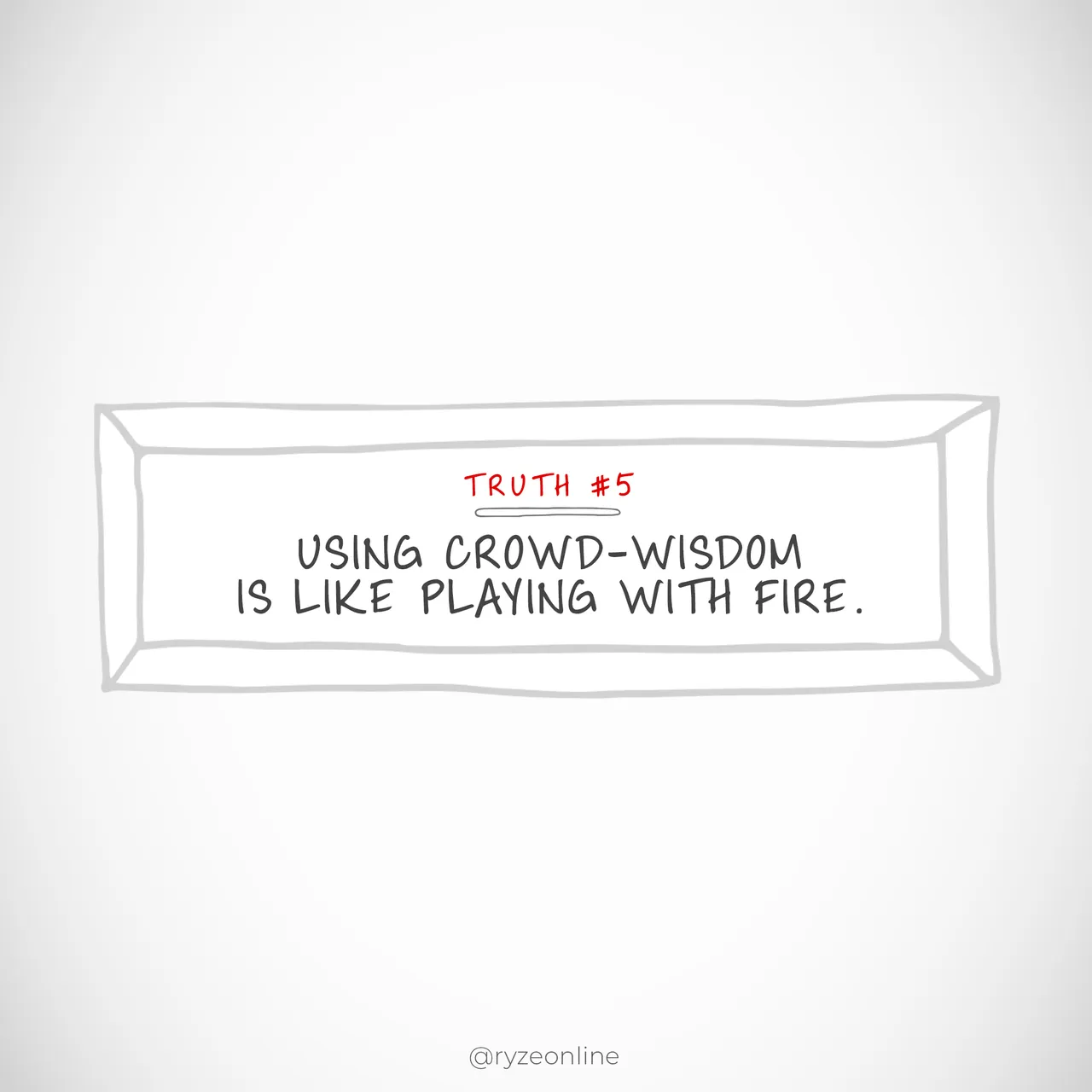
Wisdom of the crowd sounds good in principle, after all, it worked in "Who Wants To Be A Millionaire" right? But consider this: The crowd also burned 'witches' (actual human beings), in Salem. The crowd followed Hitler and Stalin for huge chunks of time. There's even documentation of a crowd attacking a pediatrician simply because the crowd wasn't wise enough to understand the difference between a doctor who helps children, and a sexual predator who takes advantage of them.
And even things that seem 'harmless' by the crowd, may not be the best use of society's resources. For example, 'the crowd' invested tons of money into Pet Rocks a few decades ago. Whether you're for pet rocks or not, it's likely not a 'crowd decision’ our current 'crowd' would label as 'wise.' Or is The Lord of the Rings the greatest work of literature of the 20th Century? Is The Shawshank Redemption the best movie ever made? Both films were awarded these titles by public votes. You don’t have to be a literary or film snob to wonder about the wisdom of the so-called ‘crowd’.
Wisdom of the crowd works best on anything you can aggregate and find the average answer for: How many beans are in this jar, how much does this man weigh, how big is this field, etc. It can be applied to other types of problems as well, but I'm not sure how recommended it is. For subjects requiring mastery, high-quality leadership, or deep understandings of human psychology. Using the 'wisdom of crowds' in these areas tends to end up in catastrophe. For example, the 4-minute mile would never have been run following the wisdom of crowds, nor would humans have developed airplane flight. It took bold individuals ignoring the crowd's 'wisdom' in these cases.
Perhaps it's simply because those crowds weren't 'correctly' using the wisdom of the crowd? There are a few keys that tend to get ignored when implementing proper crowd judgment, causing a poor result:
- A. Each crowd member's decisions must be independent of one another. (Which means if you can see like-counts, votes, talk to friends, etc. your decisions aren't independent, are instead heavily pre-influenced.) This is because groups tend to drift towards consensus while sacrificing accuracy and truth. (This tendency has played a major role in all past financial crises.)
- B. The crowd must be composed of extremely diverse members. A crowd of programmers will reach less accurate answers on a given topic than a crowd of some artists, politicians, programmers, models, and more. Or a crowd of C++ coders will give less accurate answers compared to a crowd of various C++, Python, HTML, PHP, and Assembly coders. Knowing who is in your 'crowd,' and how truly diverse they are, is vital before attributing to them any real wisdom.
- C. The crowd must be relevant. Sampling a crowd of toddlers for decisions about Adult Workplace Safety is not likely to produce great results.
- D. Reliable methods to aggregate and manage all the crowd's opinions must be used.
How This Applies To Hive:
A) If Hive wants to leverage crowd-wisdom properly, influential factors such as 'reputation', social proof, and visible vote counts should be handled with exquisite care or removed entirely. "Who Wants To Be A Millionaire’s" crowd would have failed hard if everyone got to see the vote-counts while they were voting on answers. (Instagram ran a similar experiment with blind-likes, the world did not end.)
B) If Hive wants accurate crowd-decisions it's wise to add people who may disagree strongly with the main group, creating a diverse crowd. (ie: If someone who has 'centralized views' joins the chain, unless they're hurting people, see them as adding valuable diversity).
C) And if Hive wants crowd-sourced governance, the 'crowd' used for this should be governance-savvy, or at least governance-relevant. They should understand basic leadership.
Is this how Hive uses the wisdom of the crowd? Maybe, I'm new to Hive, and couldn't say. But I do know that most 'wisdom of the crowd' users just create echo chambers and push out any disagreeing voices. I know most fail to use crowd-wisdom effectively. Instead they 'think' they're using the wisdom of the crowd well, but due to inaccurate self-assessment (truth #3 above), they're actually running more of an oligarchy.
Running an oligarchy is fine with me --people have done it for centuries-- but it's not recommended to pretend there's a crowd-wise platform if you're setting up an oligarchy instead. That's shady stuff. If Hive's unable to use crowd-wisdom with integrity, what it'll end up with is mob rule, which can get quite unpleasant. Food for thought.
Using crowd-wisdom requires mastery, and without that, we get mob-rule.
We May Ask Ourselves:
Are we really using the ‘wisdom of the crowds’ wisely, effectively, and well? Why or why not?
Every choice or action sends a message.
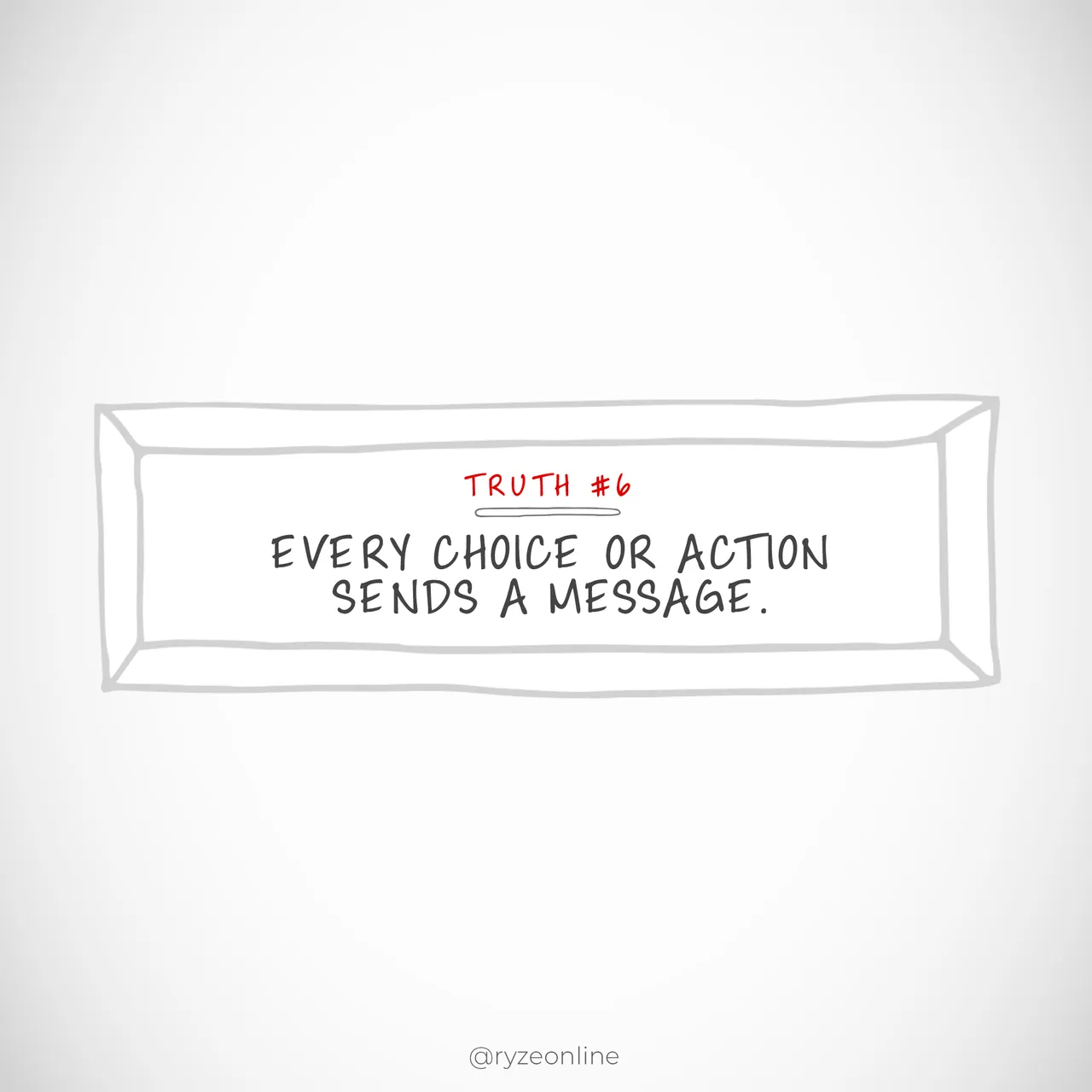
Every action, interaction, transaction, or inaction is a form of communication. People are 'sending a message' and communicating all the time without even realizing they're doing it. When a charismatic person enters a room, they do it with many subtle body-language cues that communicate confidence. Onlookers notice it and gravitate towards this person. The charismatic person hasn't said a word, but every choice they made about their fashion, their posture, their timing, their gaze, and more have communicated something. They have sent a message, and others are receiving that message a certain way.
Similarly, an 'innocent bystander' standing by and watching someone get bullied sends a message too. It looks as if their inaction isn't communicating anything from the outside, but they're actually communicating a lot. Their inaction sends a message to the bully, it sends a message to the person being bullied, it sends a message to anyone else around, and it sends a message about what type of person the bystander is... to themselves. Note: I cover this in-depth in my two-part Masterclass In Communication. It's common for people to not even realize what message they're sending. It's also common for a well-crafted message to be broadcast to others and to be (intentionally or unintentionally) misunderstood. We can't control the latter, but we can control the former.
Anyone who is communicating would be wise to do their absolute best to ensure their message is received as clearly as they're able, and to make sure they're aware and clear in their intentions behind all their communications with others.
How This Applies To Hive:
Act with good intentions. Really think your choices through. Because every action, whether a giant upvote, a miniscule downvote, a comment (or even neglecting to comment,) sends a message to others. It sends a message to the authors. It sends a message to commenters & consumers. It sends a message to whales. It sends a message to minnows. It sends a message to outside investors. What message does each one send?
That's for each Hiver to decide for themselves, but to pretend these actions communicate nothing is completely false. Ultimately, Hivers who misuse their choices, actions, and power of communication tend to reap poor results, while those who are aware, intentional, and uplifting with their communications tend to elevate the platform for all.
You’re likely miscommunicating far more often than you realize.
We May Ask Ourselves:
What intentions am I communicating with my tiniest actions, such as my posture, commenting approaches, or liking/voting practices? How well am I really communicating my intentions?
A society is only as good as its leaders.
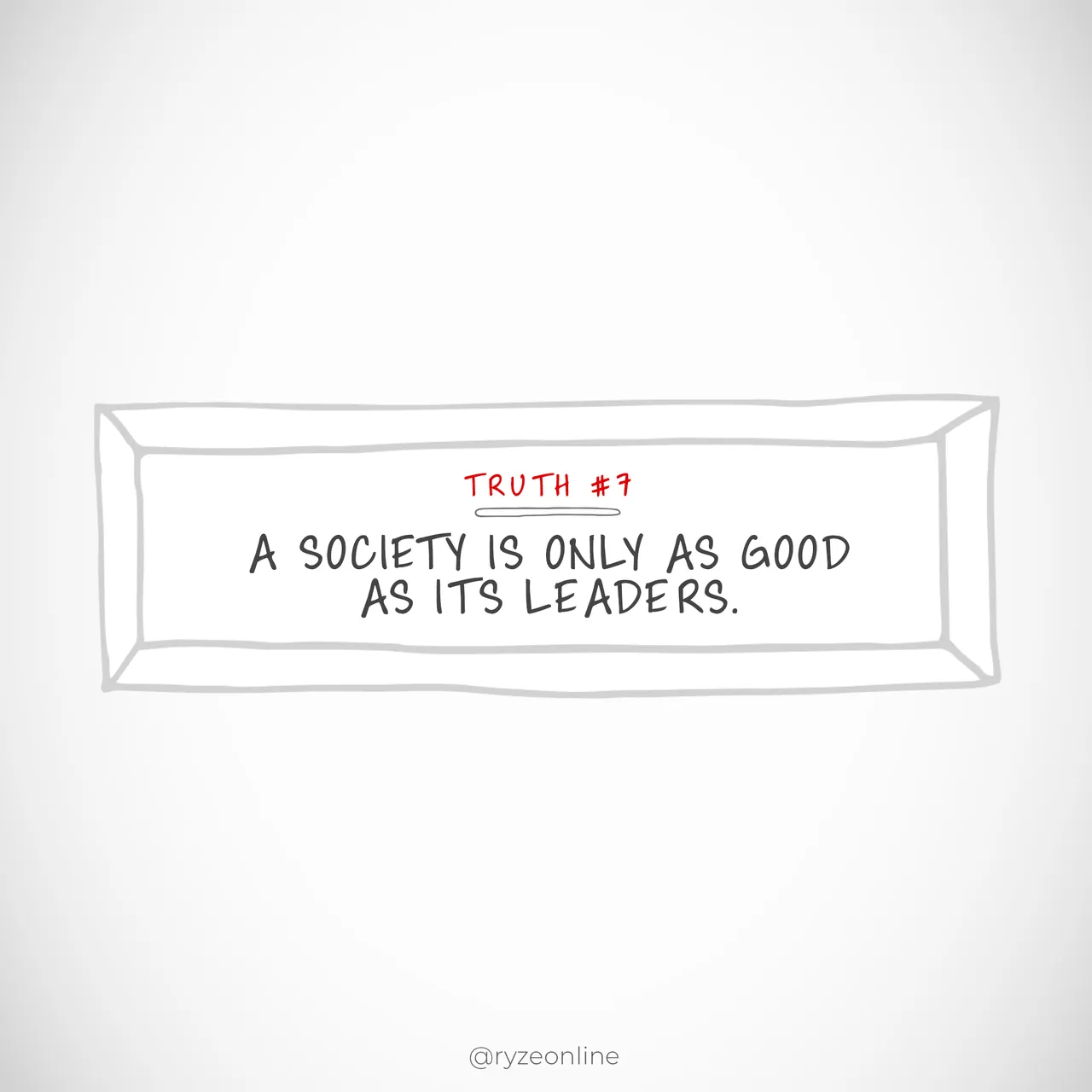
Tired of abuse? Look to the leaders. Concerned about power? Look to the leaders. Concerned about downvote culture? Look to the leaders. But do it with kindness and understanding, because the masses have just as much responsibility too. And just so we’re clear ‘the masses’ exist in every group. Even Hive. ‘The masses’ is just another word for ‘the majority’ of people. And there’s no shame in being part of the masses. It’s not bad, or wrong. It just is what it is. Look at Hive, for example:
A few Hivers are influential whales. A few Hivers are high-up devs. A few Hivers are heavily active and invested. But the ‘mass’ of Hivers are just doing what they can, following the lead of bigger or more established Hivers, and going with the flow. The masses tend to follow people with substantial power, influence, beauty, talent, persuasiveness, etc. The masses rarely think for themselves. (see truths #3 & #4) The masses are looking for as comfortable a life as possible, with as little thinking and mental effort as possible. (I can hear some of you thinking ‘J, are you suggesting I don’t put in a lot of mental effort?’ And to that, I say again… see truths #3 & #4, because it’s possible you are, but in order to know, you’d have to be adept at critical thinking & self-assessment.)
And so, with any significantly sized group, the majority of people are ‘followers’ looking toward leaders to give them the comfortable life they seek, and they’ll follow anyone who appears to do so. This applies to businesses and corporations, it applies to communes, it applies even in families. There are people of higher influence in the group, and there are those of less influence. And those of lesser influence will 'go along' with those of higher influence out of convenience, fear, adoration, self-preservation, and any number of other motivations. Due to truth #1, there's no point in trying to eliminate the power imbalances that exist in all groups, there are only approaches towards healthy navigation of them.
Ultimately, whether by revolution, assassinations, democracy, etc... If a society can’t figure out a way to secure high-quality leaders, it’s going nowhere fast. This applies to the leaders of a business, the leaders of a family, or the leaders of a ‘decentralized’ social platform.
How This Applies To Hive:
Hive is a society. It has leadership just as any group of humans has. (Even if the leadership is subtle, hidden, or implied.) And Hive as a society can only be as good as its leaders. Leadership can be changed, power dynamics can shift, but like all groups of humans, it will never disappear completely. We can no more remove leaders/followers than we can light/dark, or joy/pain. These are foundations woven into the fabric of nature and the universe, and it'd be wise for Hivers to make peace with this.
Leaders/followers will always exist, make peace with it and find your role.
We May Ask Ourselves:
What makes a truly good leader? How can I tell a good leader from a bad one? Who are our current leaders and where are they taking us?
Policing & censorship are present in all human groups.
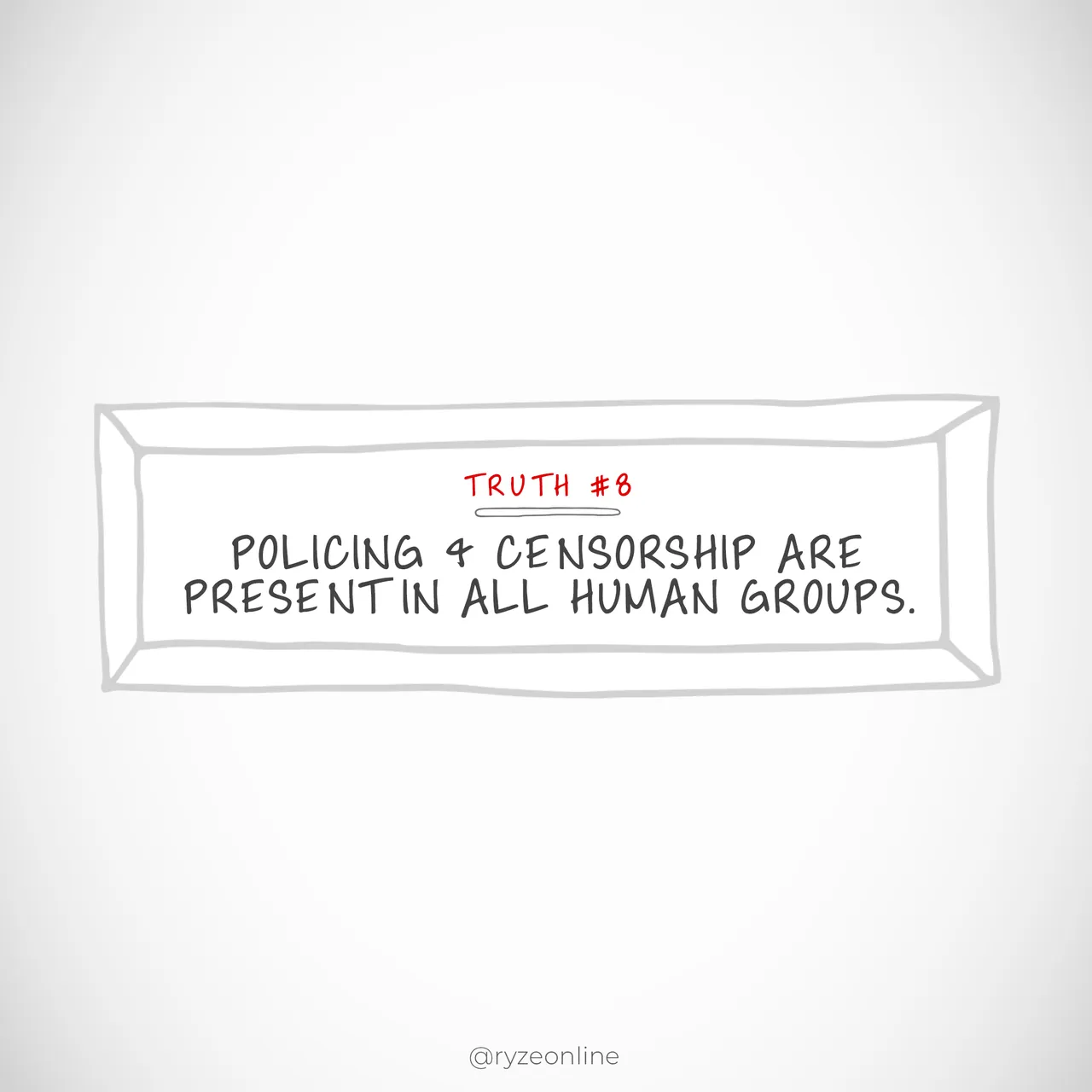
Any society will do its best to 'self-police', or 'self-regulate', when it encounters problems. If people are littering and the environment is becoming unpleasant to live in, the leaders or the majority will implement rules, incentives, punishments and so on in order to resolve the issue. Same thing applies if members of the group are stealing from one another, abusing each other, etc. This applies to a small family in a medieval hovel, to a modern, decentralized, web 3.0 digital country.
So, if you form a new group of any size, it won't be long before some form of 'law' and 'policing' sprouts up. This is especially annoying to anarchistic or spiritual communes, because people join groups like these with the strong expectation of being 'rule-free' and 'policing-free', and are then furious to discover that rules, policies, and policing of some kind are unavoidable.
The interesting part here is that not all policing-methods are created equal. Iceland scores an impressively low 1.078 on the Global Peace Index (lower is better.) Iceland has extremely low homicide rates, few people in jail (per capita), and few terrorist events. Iceland is the number one most peaceful, crime-free, country in the world according to the GPI. Compare that to the U.S. which came in ranked 121st on the Peace Index with a score of 2.337, or to Afghanistan scoring 3.631, ranked at 163rd in the world. If you were to study the laws, policies, policing, and overall culture of these different societies, it might surprise you. This is because some approaches towards keeping the peace and ensuring helpful behavior by the members of a society are better than others.
How This Applies To Hive:
Hive is a fairly new community (or company, or society, or group, or whatever label you want to use), and it is developing its own policies and policing as it goes, just as any group would. Issues that may end up being addressed are: everything from fake-account-detection, to spam-prevention, to civil disagreement, to corrupt agendas, and more.
Not all policing is created equal, learn to assess your communities properly.
We May Ask Ourselves:
What skills or situations is there a chance of me assessing incorrectly in my life? Are the people who are choosing these policies and policing methods on the right track? Far off the mark? Somewhere in between? Are Hive's methods closer to Iceland's sublime peace-keeping record, or more like the U.S. or even Afghanistan? And if Hive isn't quite Iceland-level peace-keeping yet, are there healthy, kind, productive ways to nudge us toward that?
Humans are belief-based operators.

Why do downvotes happen? Simple: beliefs. People believe they’re doing the right thing, or best thing for themselves, or best thing for their family, or community, or whatever. No matter what action someone chooses to do, their beliefs guide, inform, and direct their actions. Including me and you. This means that a leader with a high degree of persuasiveness can convince others to believe in them, ensuring others behave as the leader desires. (This is why persuasiveness, propaganda, advertising, and related disciplines are so powerful.) And if you think persuasion or advertising has never worked on you, I suggest you think again.
"A skilled magician using the crudest of methods can baffle the most intelligent of audiences. With a few simple props and an intriguing story, an experienced con man can make a fool of virtually anyone. And with the proper delivery, a comedian can pry a laugh from even the most stoic among us." - Blair Warren, Author of “The Forbidden Keys To Persuasion.
This belief/behavior link also means people who refuse to learn persuasion-basics will struggle to get others to do what they want. This truth is interesting because everyone has ideas they’d like to see happen. But even if they’re the best ideas in the world, others won’t believe in them, if they’re already believing in the more persuasive fellow next door instead. People only have so much belief to go around on a certain topic. If they believe Trump is the messiah, they’ll have minimal belief to give Hilary. If they believe Steemit is the best, they’ll have minimal belief in Hive. If they believe a defendant is guilty, they’ll have minimal belief to give towards their innocence.
How This Applies To Hive:
Let’s say a minnow on Hive has an idea. And let’s say a whale next to him has the exact opposite idea. Which idea will end up being implemented by the community? Well it depends on whether the minnow turns out to be more persuasive than the whale, or vice-versa. And I don’t mean ‘persuading using logic’, I mean, really, truly, persuasive, using whatever means gets the job done. Sometimes people use really shady persuasion-tactics, but they work, and that persuasion beats any opposing ideas.
Bernie Madoff persuaded a lot of people to believe in some pretty shaky schemes that weren’t in their best interests… but it worked because he knew that humans are belief-based operators, and as he persuaded them to believe, he got the result he was after. (Eventually society punished him for this misuse of persuasion, but that concept is addressed more in point #8.) On the flipside, charities persuade people to donate to causes all the time. Millions of people have donated to cancer-cures, without knowing at all how their money will be spent. Persuasion works on everyone at some point in their lives, period. It’s worked on me. It’s worked on you. In fact, every Hiver is here because of something that persuaded them to go through Hive’s … unique … sign-up process.
The growth of Hive hinges on the persuasion-skills of its wisest members.
We May Ask Ourselves:
Am I being persuaded in positive ways? Am I persuading others in positive ways? How big is my persuasion’s impact in my community? What beliefs do people have that make them do what they do, and am I persuasive enough yet to change those beliefs?
These 9 truths are pretty self-evident.
(At least they are to me.) And if anyone thinks them through properly, they’ll realize the truth of all 9 statements. They're true the same way "gravity exists" is, or "the sun is hot to humans" is. Sure, there’s always someone who’ll pipe up and say “How do you know gravity exists? What if it’s all an illusion?” And I get it, I’ve been there. It’s something every philosophy student throws around to troll.
But getting all meta and discussing life-as-illusion, or as simulation, or as ‘the matrix,’ is impractical and doesn’t really help anyone. When I say 'truths' here, I mean experiential, practical, relevant-to-life truths that are worth understanding if we want to achieve our dreams and succeed on Hive effectively. I understand that what’s clear to me though, isn’t automatically clear to others, no matter how well I’ve explained things.
Especially with new ideas. New truths can be challenging, and I don’t want anyone to take my word for these things. Think them through on your own. Try the ideas on for size. See if they help you create a better life for yourself, and if they don’t, by all means, dismiss them.
I’ve taken the time to share these with you specifically to help. Because I’ve seen people struggle against truth, and I’ve done it myself, and it never goes well. And these are things I wish I was taught earlier, instead of learning through long journeys and much hardship. You’ll likely read many words on the internet this week, but I hope you can feel the love I’ve poured into these, and receive them as valuable.
That said, I understand if a reader won’t allow themselves to admit these truths, because the truth can be a bitter pill, hard to swallow. When I was younger I fought against every single one of the points above, and it took me years to grow beyond my limited understanding. For example as a teen, I was ‘absolutely sure’ that I could start a sustainable commune with ‘no rules, policing, or censorship,’ and it’s likely others believe as I once did, and won’t hear anything to the contrary. That’s fine, even encouraged, I only ask that if you do feel like you absolutely must disagree with any of these truths, to…
...please do so in a kind, mature, civilized manner.
Anyway, thanks so much for reading, commenting, sharing, or even skimming. (& special thanks to @cynshineonline for proofing.) I appreciate you and wish you a fantastic day.
~J-Ryze
P.S. Tagging a few peeps who might be interested in this: @wil.metcalfe , @thoughts-in-time , @grampo , @joebrochin , and @regenerette . And if you think of anyone else who might get value from these truths, please share it with them.
P.P.D. Si algún latino quiere traducir esto al español, creo que muchas de estas verdades pueden ser útiles para la gente.
